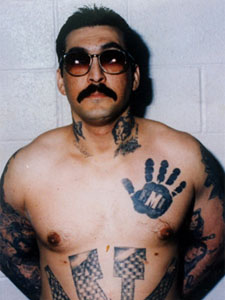Throughout the history of humanity, many secret societies existed to fight oppression or tyrannical domination, while others formed on subversive platforms and worked against established authorities to pursue objectives and desires. The same can be said about street gang organizations and modern prison gangs throughout the United States, which mostly formed to protect their communities and fought against oppression and domination of mainstream society. All secret societies in the past and present share three qualities: they are exclusive, they claim to have special secrets, and they show a strong inclination to favor their own. Due specifically to this type of secrecy and mystery, they can increase rapidly because they invoke confusion, curiosity, fear, and power. In low-income gang-infested communities where people feel goalless and powerless, it is easier for this type of subversive organization to exploit an individual's weakness and create an organizational culture.
This type of culture establishes norms, behaviors, customs, mannerisms, and dress codes, similar to secret societies in the past. The dress code of street gang members symbolizes uniformity and equality and reflects battle dress posture, which reinforces the resistance of the status-quo. The look itself communicates fear, intimidation, and the willingness to participate in urban warfare. Members of secret societies often spoke in code or ancient languages not easily understood by the masses, similarly many prisoners have learned indigenous or uncommon languages, including sign language, back-slang, or write letters in code to carry out clandestine activities. Most street and prison gangs adopt initiation rites and pseudonyms, use numerology, tattooing, markings, or graffiti-style pictographs as custom, have fiduciary obligations, and often revere weaponry to symbolize how they 'live by the sword and spirit' like the Knights' Templar.
Any person who has joined a modern-day secret society has succumbed to 'groupthink' and understands the consequences of this type of organizational culture. Going to prison or getting murdered for the street gang are common consequences, which are often caused by peer pressure where one man or group of men can have ultimate influence over an individual's decision-making authority. And that is the true nature of the contemporary secret society; to develop a collective body of individuals who subject themselves voluntarily to an organization that has absolute authority over them. The objective is the desire for power, love of mystery, a sense of being special, belonging to something bigger than yourself, and the feeling that one will gain something extraordinary by membership. Any organization that can accommodate this on a large scale can exploit a certain demographic or population for a means of attaining power.
